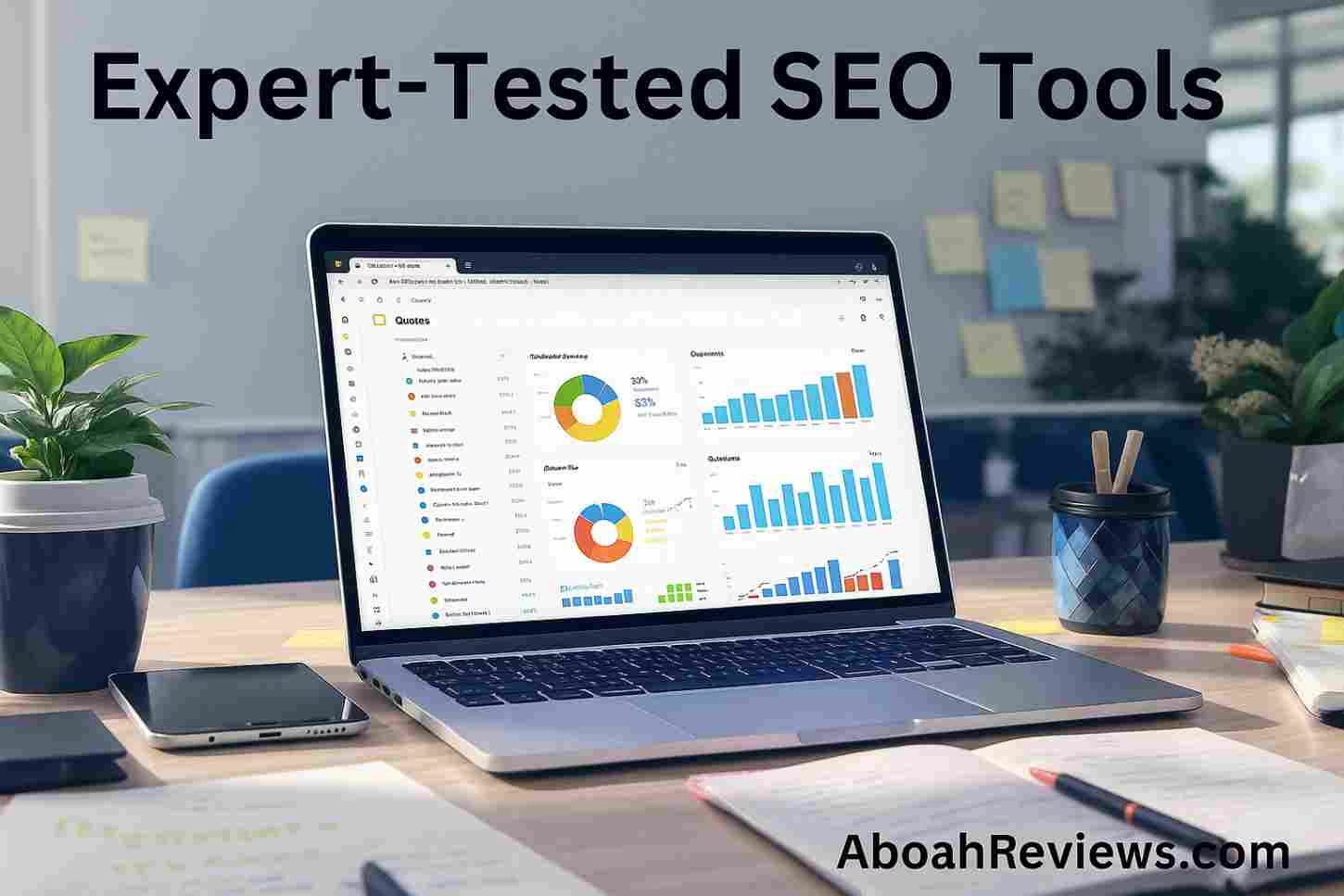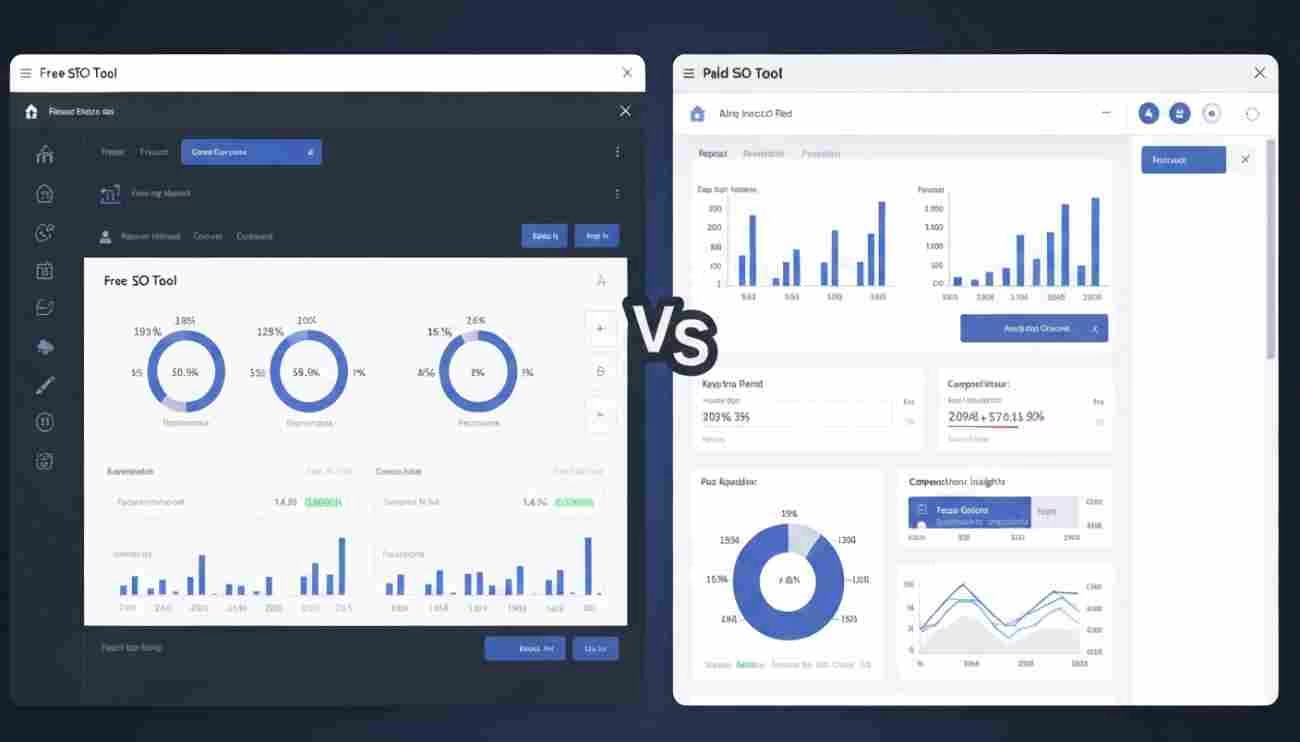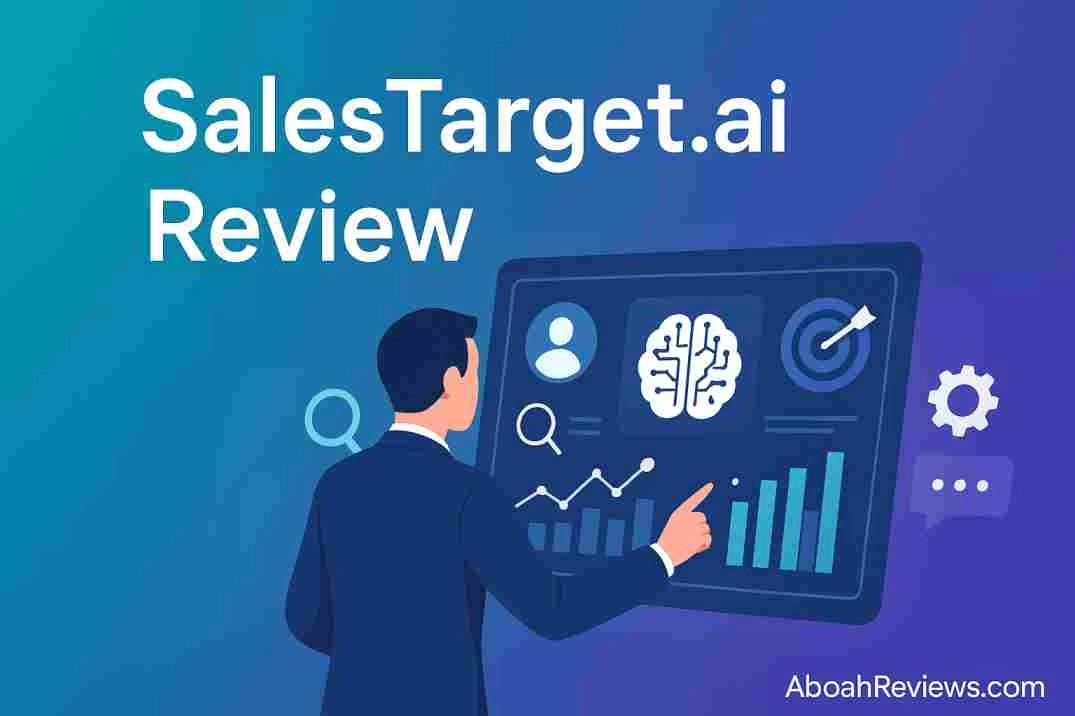Over the past four years, I have collected the best SEO tools – both free and paid – that I use almost daily. How to choose the best SEO tool becomes critical when you consider that today’s SEO market is more competitive than ever.
Algorithm updates and emerging competitors create new challenges for businesses and agencies alike.
SEO marketers can’t do what they do without the right SEO tools – tools that help us track performance metrics, diagnose problems, suggest improvements, and automate tedious tasks.
In fact, with just free SEO tools alone, many SEO professionals have been able to achieve impressive rankings. But choosing among the sea of options can feel overwhelming.
Your goals will ultimately dictate the kind of SEO software you need. Are you focusing on keyword research? Technical audits? Content optimization? Or do you need an all-in-one solution?
Small businesses typically find a sweet spot in the $100 to $300 per month range for a solid all-in-one SEO platform.
In 2025, intuition and outdated methods simply won’t cut it anymore. Success depends on leveraging powerful tools for SEO analysis that show you exactly what works and what doesn’t.
Through this guide, I’ll share how to choose the best SEO tool based on your specific needs, budget, and goals. Let’s find the right SEO software to boost your rankings this year.
What Makes an SEO Tool the Best in 2025?

In my experience testing dozens of SEO tools, I’ve noticed something interesting: the definition of what makes an SEO tool “the best” changes every year.
Gone are the days when simple keyword tracking was enough. Let me show you what truly matters in 2025.
Why SEO tools are essential for rankings
I remember trying to manage SEO manually a few years ago – analyzing rankings by hand and guessing what my competitors were doing. It was exhausting and ineffective.
Today, using SEO tools to automate repetitive tasks isn’t just about saving time; it’s the new standard.
Have you ever wondered how much time quality SEO software can save you? On average, professionals using AI-powered SEO tools save 12.5 hours per week.
What tasks would you rather outsource to technology? Most SEO professionals use tools for keyword research, competitor analysis, technical audits, and content optimization.
These tools help identify opportunities that would be nearly impossible to spot manually.
Additionally, they provide data-driven insights that remove guesswork from your strategy.
How SEO software has evolved recently
SEO software has come a long way since the basic tools of the mid-1990s. Those early products typically performed simple tasks like keyword research and link analysis.
Throughout the 2000s, SEO tools added more advanced features: on-page optimization, competitive analysis, and social media integration.
The most significant shift happened during the 2010s when machine learning capabilities emerged, helping identify and fix SEO issues more quickly.
Furthermore, integrations with platforms like Google Analytics and Google Ads became standard, offering a more holistic view of marketing efforts.
Now, as we move through 2025, the market has transformed completely. Modern SEO software offers real-time analytics, predictive analysis, and AI-driven insights that go beyond traditional platforms.
Have you noticed how tools now automatically highlight opportunities instead of requiring manual interpretation?
Key trends shaping SEO tools in 2025
The most prominent trend in 2025’s SEO tools is AI integration. As a result of this shift, 86% of SEO professionals now use AI in their workflows.
Search interest for “AI SEO” has moved up by 1,900% over the past 5 years. Among companies with over 200 employees, 83% report improvements in SEO performance since implementing AI.
Other key trends include:
- Data-driven decision making: Real-time analytics allow for quick adaptation to maintain competitive rankings
- E-E-A-T integration: Tools that help measure Experience, Expertise, Authoritativeness, and Trustworthiness signals are gaining importance, with search volume for “eeat” increasing by 344% over five years
- Content optimization focus: AI and human content perform almost identically in rankings, with 57% of AI text and 58% of human text reaching Google’s top 10 results
- Multi-platform visibility: Tools now track performance across traditional search engines and newer AI platforms like ChatGPT and Google AI Overviews
Do you ever wonder if your current SEO tools are equipped to handle these changes? As search engines evolve to provide better user experiences, your tools must adapt too.
The question isn’t whether you need SEO tools; it’s whether you have the right ones for 2025’s unique challenges.
Types of SEO Tools and What They Do

When I first started learning about search engine optimization, I felt overwhelmed by the sheer number of tools available.
Understanding the different types of SEO tools and their specific functions helped me choose what I really needed.
Let me break down the main categories to help you make sense of the options.
1. Keyword research tools
Keyword research tools help you discover what your audience is actually searching for. These tools show search volumes, keyword difficulty scores, and related terms to target.
Most keyword tools provide extensive data on monthly search volume across different countries, competitive analysis, and even seasonal trends.
I find that tools like Semrush’s Keyword Magic Tool provide access to over 26.2 billion keywords, helping you find semantically related terms and question-based keywords organized into topic clusters.
Google Keyword Planner remains a solid free option, especially if you’re already using Google Ads. Other popular options include Ahrefs, KeySearch, and AlsoAsked, which specializes in revealing questions your audience is asking.
Do you know which keywords your competitors are ranking for that you’re not? Good keyword research tools will tell you exactly that.
2. Rank tracking and monitoring tools
Once you’ve identified keywords to target, rank tracking tools help you monitor how well you’re ranking for them. These tools show your position in search results across multiple search engines, devices, and geographic locations.
Position tracking tools let you track up to 5,000 keywords daily on business plans and alert you when rankings change significantly. The best rank trackers provide unbiased, third-party verification for every keyword you track, down to city and ZIP code level. Many also calculate your “share of voice” – the percentage of searches leading to your website versus competitors for key terms.
3. Technical SEO and audit tools
Technical SEO tools crawl your website like search engines do, identifying issues that might be hurting your rankings.
Have you ever wondered why some pages on your site aren’t showing up in search results? These tools can tell you.
Site audit tools check for broken links, duplicate content, crawl errors, and hundreds of other technical factors.
For example, Screaming Frog examines URLs for common SEO issues and creates XML sitemaps.
Google Search Console, which is free, analyzes search queries, impressions, and lets you submit your sitemap directly to Google.
4. Content optimization platforms
Content optimization tools analyze what’s working for top-ranking pages and help you create content that matches or exceeds them.
I’ve found these incredibly helpful for improving existing content.
Surfer SEO gives you a live content score and shows exactly which keywords, headings, and structure you need to include.
Clearscope helps you produce highly relevant content by analyzing the top 30-40 search results using advanced NLP models from IBM Watson, Google, and OpenAI. These tools save me hours of manual research.
5. Backlink and competitor analysis tools
Looking at your competitors’ strategies can reveal opportunities you might be missing.
Backlink analysis tools show which websites are linking to your competitors and the quality of those links.
Ahrefs lets you study what’s working for any website – see where their traffic comes from, which pages perform best, and how they get discovered across search, AI, links, and ads.
SpyFu reveals competitors’ PPC strategies, while SimilarWeb provides detailed traffic and engagement insights.
Have you thought about how much time you could save by learning directly from your competitors’ successes rather than starting from scratch?
8 Best SEO Tools for Higher Rankings in 2025

After testing hundreds of SEO tools over the years, I’ve narrowed down my top picks for 2025.
Have you wondered which tools truly deliver results? Here’s my list of the best SEO tools to boost your rankings this year.
1. Surfer – Best for content optimization
Surfer helps you create content that ranks by comparing your pages to top performers. It gives you real-time feedback on structure, word count, and keyword usage.
What I love about Surfer is how it identifies content gaps and adds missing context that matters to both Google and AI assistants.
The tool even helps humanize AI-written content to pass detection tools. Starting at $99/month, it’s become essential for content teams who need to optimize quickly.
2. Ahrefs – Best for backlink and competitor research
Whenever I need to dig into competitor strategies, Ahrefs is my go-to. It reveals where competitors get their traffic, which keywords they rank for, and who links to them.
The tool consistently ranks as “top dog” in SEO industry polls.
What makes Ahrefs powerful is its competitor gap analysis that shows exactly which keywords your competitors rank for but you don’t.
3. Semrush – Best all-in-one SEO software
Semrush offers the most comprehensive SEO toolkit available with access to over 26.2 billion keywords.
Although I found the interface somewhat overwhelming at first with almost 50 different sub-sections, the data quality is outstanding.
Semrush outperforms competitors in value for money and customer satisfaction.
4. Google Analytics – Best for website performance tracking
Google Analytics gives me a complete view of the customer journey from first visit to purchase.
The platform helps understand user behavior across websites and apps throughout their entire lifecycle.
With its event-based tracking and cross-platform reporting, it provides deeper insights than most analytics tools.
5. Yoast SEO – For On-Page Optimization
Yoast simplifies WordPress SEO with intuitive indicators showing what needs improvement.
Those green and orange circles have saved me countless hours of guesswork.
It excellently analyzes content readability and helps optimize how your site appears in search results and social media.
6. Screaming Frog – Best for technical audits
This desktop application crawls your website like search engines do, identifying technical issues that might hurt rankings.
It analyzes everything from meta tags to broken links. The tool offers four distinct modes to analyze different aspects of your site.
Though the learning curve is steep, it’s unmatched for technical SEO analysis.
7. Google Search Console – Best free SEO tool
As a free tool directly from Google, Search Console helps monitor and improve how your site appears in search results.
It shows which queries bring traffic to your site, helps submit sitemaps, and identifies indexing issues.
Unlike many tools, it provides data straight from Google’s index.
8. BrightLocal – Best for local SEO tracking
For businesses targeting local markets, BrightLocal excels at tracking location-specific rankings.
Its Local Rank Tracker monitors rankings in both map and organic listings.
The tool simulates searches from specific locations, giving a true reflection of how you appear in local search results.
How to Choose the Best SEO Tool for Your Needs

Choosing the right SEO tool can feel like trying to find a needle in a digital haystack.
Based on my trials of over 350 SEO tools available in 2025, I’ve learned that knowing how to choose the best SEO tool makes all the difference between wasting money and seeing real results.
Core features to expect from top SEO software
Almost all quality SEO platforms share several core capabilities that should be non-negotiable:
- Keyword research that uncovers search volume and competition levels
- Rank tracking to monitor your position for target keywords
- Site auditing that identifies technical issues like broken links and slow loading times
- Backlink analysis to understand your link profile and find new opportunities
- Competitor analysis to see what’s working for others in your industry
When evaluating these features, look beyond marketing promises. During my testing, I found data accuracy varies dramatically between platforms.
For instance, Ahrefs consistently provided organic traffic data closest to Google Analytics (off by just 25 users) compared to competitors.
Why AI and automation are now essential
AI is no longer optional in SEO software. The best AI-driven tools now automatically highlight opportunities rather than requiring manual interpretation.
This shift has led to 83% of companies with over 200 employees reporting improvements in SEO performance since implementing AI.
Many platforms now offer AI-powered keyword suggestions, content optimization, and even automated workflows.
I’ve seen firsthand how tools like Koala AI and Surfer SEO can dramatically speed up content creation while maintaining quality.
The role of user experience and integrations
User experience substantially impacts your productivity. Nearly 90% of online users won’t return to a website after a bad experience, and the same principle applies to SEO tools.
Look for intuitive interfaces and customizable dashboards. The ability to connect with other marketing tools, such as CRM systems, can streamline workflows and enhance data analysis.
This connectivity has become increasingly important as businesses seek comprehensive data insights.
1. Define your SEO goals and challenges
Before shopping for an SEO tool, I always ask myself: What exactly am I trying to accomplish? Starting with your company’s big-picture objectives makes choosing the right tool much easier.
Ask yourself:
- What specific metrics am I trying to improve?
- Am I focusing on technical SEO, content optimization, or link building?
- What key performance metrics do I own?
Using the SMART framework (Specific, Measurable, Achievable, Relevant, Time-based) for SEO goals will help you identify exactly what capabilities you need.
2. Match features to your business type
Different business types require different SEO approaches.
For small businesses, an all-in-one platform like SE Ranking often works best, as it simplifies management with one login and bill.
Agencies, meanwhile, need extended tool limits, increased user access, reduced monthly costs for multiple subscriptions, and custom reporting options.
Enterprise businesses typically need more comprehensive data and depth of analysis.
3. Consider ease of use and learning curve
The best SEO tool is one you’ll actually use.
During my testing, I found many powerful platforms that gathered dust because they were too complicated to use regularly.
Technical SEO tools like PageVital often fail because of people, not features. Keywords Everywhere works brilliantly for solo operators but breaks down when multiple team members need access.
Before committing, assess whether the platform aligns with your team’s technical expertise.
4. Evaluate pricing and scalability
When comparing pricing, look beyond the sticker price. Some tools start affordable but quickly become expensive as your needs grow.
Subscription costs rarely stay static – Frase’s basic plan works well until you hit monthly query limits, potentially doubling your costs.
Most SEO platforms offer different pricing models:
- Monthly retainers (most common)
- Fixed contracts
- One-time projects
- Hourly rates
Balance advanced features against usability and budget constraints. Even free or low-cost tools can provide great value, especially for basic needs or smaller sites.
5. Test with free trials or demos
Never commit to an annual plan without using a free trial first.
Almost every major SEO software offers a trial period, often 7-14 days. Use this time to truly test the platform with your actual workflow.
During your trial, I recommend:
- Setting up a project for your website
- Running a full site audit
- Adding your important keywords to the rank tracker
- Researching new keyword ideas
- Analyzing a competitor’s domain
Additionally, test their support system during the trial. Send questions through live chat or email to gage response time and quality.
Good customer support becomes invaluable when you encounter issues down the road.
Have you considered what specific features would make the biggest difference for your unique SEO needs?
SEO Tool Comparison: What to Look For

The problem isn’t finding SEO tools; it’s picking the right ones. With over 350 SEO tools available in 2025, comparing them effectively requires focusing on what truly matters.
Let me share what I’ve learned from testing more than 170 tools to help you make smarter decisions.
1. Feature depth vs. simplicity
Have you noticed how some tools try to do everything while others excel at just one thing? This is the classic depth versus simplicity trade-off.
All-in-one platforms like Semrush offer nearly 50 different sub-sections but can feel overwhelming at first.
Conversely, focused tools like Wincher provide laser-sharp keyword rank tracking without the clutter.
I’ve found that enterprise platforms offering comprehensive features often cost six figures, yet even the priciest options come with surprising gaps.
Consider your priorities – do you need depth across all SEO aspects or excellence in specific areas?
2. Support and documentation quality
Support quality varies dramatically between platforms. Some offer round-the-clock support through multiple channels while others leave you deciphering documentation that “reads like ancient Sanskrit”.
When evaluating support, look for:
- Response time (same-day vs. 48-hour responses)
- Available channels (chat, email, phone)
- Knowledge bases and training materials
BrightEdge offers premium phone support with 200+ training modules but takes 3-6 months to fully implement, whereas ContentKing provides 24/5 chat support and can be operational within days.
3. Integration with analytics and CMS
How well does the tool play with your existing stack? This question has saved me countless headaches. Quality integrations enhance content management and ensure reliable data.
When evaluating integrations, ask:
- Can it handle your actual data volume?
- Does it integrate natively or require custom connectors?
- What happens when an integration fails?
- How does it handle authentication across systems?
Many tools connect with Google Analytics, providing more comprehensive insights than either tool alone. Yet some “seamless integrations” actually require months of development time.
4. Reporting and white-label options
Agencies particularly need customizable reporting that doesn’t scream “third-party tool.”
White-label SEO tools let you generate reports under your agency’s branding, combining data from multiple sources like Google Analytics, Search Console, and Ahrefs.
Look for platforms offering:
- Customizable dashboards that prioritize relevant data
- Automated reporting schedules
- Real-time client access options
- Templates for different industries
SE Ranking earns top marks for white-label features, while DashThis focuses exclusively on streamlined, client-ready dashboards.
5. Real user reviews and expert ratings
What do actual users say? Beyond marketing claims, real experiences reveal a tool’s true value.
When researching reviews, I focus on platforms like G2, which has verified reviews from over 10,000 users.
Smart evaluation involves looking at:
- Specific use cases similar to yours
- Mentioned strengths and limitations
- Reported learning curves and time-to-value
- User satisfaction with features, support, and results
Have you considered asking peers in your industry which tools they actually use regularly versus the ones gathering digital dust?
Final Thoughts On How to Choose the Best SEO Tool for 2025
Selecting the right SEO tools can make or break your online visibility efforts. Throughout my years of testing hundreds of options, I’ve learned that the perfect tool depends entirely on your specific goals, budget, and technical expertise.
Most successful SEO strategies now combine several specialized tools rather than relying on a single solution.
You might pair Surfer for content optimization with Ahrefs for competitive research and Google Search Console for performance tracking. This approach gives you depth where you need it most while keeping costs manageable.
Remember that even the most powerful tools require proper implementation. Have you considered how much time your team needs to learn a new platform?
Many businesses waste thousands on advanced software that nobody uses effectively. Start with a clear understanding of your SEO priorities, then test thoroughly during free trials before committing.
Data accuracy remains another critical factor when comparing options. Tools that provide outdated or incorrect information will lead your strategy astray regardless of their fancy features.
Therefore, verify metrics against Google Analytics during trial periods to assess reliability.
Looking ahead, AI capabilities will continue transforming SEO software throughout 2025 and beyond. Tools that automate repetitive tasks while providing actionable insights will deliver the best return on investment.
Additionally, platforms offering seamless integration with your existing tech stack will save countless hours of manual data transfers.
The SEO market changes constantly, but your approach to tool selection shouldn’t. Focus on your specific challenges, evaluate options methodically, and choose solutions that genuinely support your goals rather than following industry hype.
After all, the best SEO tool isn’t necessarily the most expensive or feature-rich; it’s the one you’ll actually use consistently to improve your rankings.
Frequently Asked Questions About How to Choose the Best SEO Tool
1. What factors should I consider before choosing an SEO tool?
When choosing an SEO tool, consider data accuracy, ease of use, pricing, integrations with Google Analytics or Search Console, and customer support. It’s also important to test whether the tool fits your workflow and project size.
2. Which SEO tool is best for beginners?
Google Search Console and SE Ranking are excellent for beginners. They offer clear metrics, intuitive dashboards, and free or low-cost plans ideal for learning keyword tracking and site performance basics.
3. How much should I expect to spend on a good SEO tool?
Most premium SEO tools range from $30 to $120 per month, depending on the features. Enterprise-grade platforms like Semrush and Ahrefs cost more but provide deeper analytics, content optimization, and competitive tracking.
4. Can I use free SEO tools instead of paid ones?
Yes. Free tools like Google Analytics, Search Console, and Ubersuggest can cover basic keyword research and site audits. However, paid tools often offer more accurate data, competitor tracking, and advanced reporting options.
5. What’s the difference between all-in-one SEO suites and niche tools?
All-in-one suites like Semrush or Ahrefs combine keyword research, backlink analysis, and on-page auditing. Niche tools (e.g., Surfer SEO or Screaming Frog) focus on specialized tasks like content optimization or technical site crawling. The best choice depends on your goals and experience level.
Fact-Check & Verification:
All statistics in this article are sourced from official vendor documentation and reputable industry studies including Exploding Topics, Salesforce, and Semrush reports (linked above). All mentioned tools were personally tested during live SEO projects between 2021–2025.
- How to Make Money With RightBlogger in 2026 (Realistic Income Blueprint) - February 12, 2026
- RightBlogger Pricing 2026: Full Breakdown of Plans, Features and Value - February 11, 2026
- RightBlogger Review 2026: I Tested This AI Blogging Tool for 30 Days - February 10, 2026

![YouMind Review 2026: I Tested This AI Creation Studio for 30 Days [Honest Verdict] 17 Youmind-Review-I-Tested-This-AI-Content-Creation-Studio-for-30-Days-My-Honest-Verdict](https://aboahreviews.com/wp-content/uploads/2025/12/Youmind-Review-I-Tested-This-AI-Content-Creation-Studio-for-30-Days-My-Honest-Verdict.avif)
